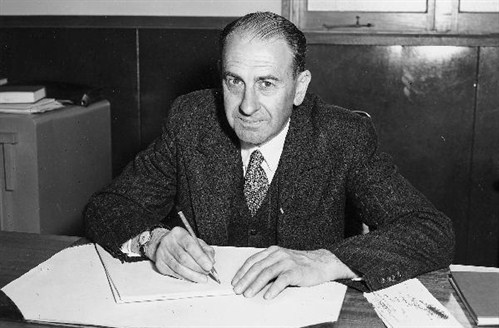Public lectures in honour of the late Sir Leslie Melville

The Sir Leslie Melville Lecture is an annual public lecture of The Australian National University. The Lecture was established in 2002 as part of the celebration of the 100th birthday of Sir Leslie Galfried Melville (1902-2002), and to mark more than half a century of Sir Leslie’s distinguished public service in the fields of monetary policy and higher education. The lecture seeks to reflect the economist and economics in public and official affairs; befitting Sir Leslie’s key role in pioneering central banking in Australia, a number of past lectures have addressed aspects of central banking.
Next Sir Leslie Melville lecture
The benefits of independent monetary policymaking in an uncertain world
Thursday, July 10 · 5:30 - 7:30pm AEDT
ANU Research School of Social Sciences (RSSS), Auditorium, Ground Floor
146 Ellery Crescent Acton, ACT 2601
Loretta J. Mester, President and Chief Executive Officer of the Federal Reserve Bank of Cleveland from June 2014 to June 2024, for the Sir Leslie Melville public lecture – The benefits of independent monetary policymarking in an uncertain world
About the Lecture
This lecture will focus on the benefits of setting monetary policy independent of short-run political consideration, looking closely at the Federal Reserve System. Loretta will provide some background on the structure of the Federal Reserve System, and the rationale for why it was designed this way. She will then discuss what is meant by independent monetary policy, and what the benefits are for businesses and households. Loretta will emphasise the importance of these points in light of the considerable uncertainty about the economic outlook.
About the presenter
Loretta was President and Chief Executive Officer of the Federal Reserve Bank of Cleveland from June 2014 to June 2024. In this role, she participated in the formulation of U.S. monetary policy, and oversaw more than 1,000 employees based at the bank’s Cleveland office. She also oversaw the branch offices in Cincinnati and Pittsburgh, which conduct economic research, supervise banking institutions, promote community development, and provide payment services to depository institutions and the U.S. Treasury. Loretta was the 11th President of the Cleveland Fed and represented the Fourth District on the Federal Open Market Committee (FOMC).
Loretta is an Adjunct Professor of Finance at the Wharton School of the University of Pennsylvania and a Senior Fellow with the Wharton Initiative on Financial Policy and Regulation. She has also taught in the undergraduate finance and MBA programs at Wharton and in the PhD program in Finance at New York University.
Most recent Sir Leslie Melville lecture
Financial Markets and Monetary Policy in Australia
Monday, November 18 · 5:30 - 7:30pm AEDT
Copland Lecture Theatre
25a Kingsley Street Acton, ACT 2601
Join Christopher Kent, Assistant Governor (Financial Markets) at the Reserve Bank of Australia (RBA), for the Sir Leslie Melville public lecture – Financial markets and monetary policy in Australia.
In this lecture, Christopher will review some key features of Australia’s financial system. He will then discuss some of the implications of these for:
- the transmission of monetary policy
- financial stability
- forward guidance.
About the presenter
Christopher Kent
Christopher has been in his current role since December 2016 and is responsible for the oversight of the RBA’s operations in the domestic and global financial markets, including the management of Australia’s foreign reserves. He briefs the RBA Board on developments in financial markets and participates as the Bank’s representative on the BIS Markets Committee and the BIS Committee on Global Financial Stability. Christopher also chairs the Australian Foreign Exchange Committee and is the Chair of Note Printing Australia.
Past lectures
Christopher Kent, Assistant Governor (Financial Markets) at the Reserve Bank of Australia
Michele Bullock, Deputy Governor of the Reserve Bank of Australia
Dr Steven Kennedy PSM, Secretary of the Department of the Treasury of Australia
"A tale of two crises: reflections on macroeconomic policy responses to the GFC and the pandemic"
Adrian Orr, Governor of the Reserve Bank of New Zealand
"The COVID-19 pandemic: Challenges and opportunities facing central banks"
Philip Lowe, Governor, The Reserve Bank of Australia
Luci Ellis, Assistant Govenor (Economic), Reserve Bank of Australia
"On Lags"
John Fraser, Secretary, Department of Treasury
Geoff Bascand, Deputy Governor and Head of Operations at the Reserve Bank of New Zealand
"Changing dynamics in household behaviour: what do they mean for inflationary pressures?"
Professor Forrest Capie, City University, London
The limits of central banking; central banks and financial crises
Professor Pierre Pestieau, University of Liege, Belgium
Dr Alan Bollard, formerly Governor, Reserve Bank of New Zealand
Dr Charles Bean, Deputy Governor, Bank of England
2010
Dr Martin Parkinson, formerly Head of the Department of Climate Change, now Secretary to the Treasury
2009
Professor R G Gregory, formerly Head of Economics, RSSS, now Visiting Fellow, RSE
2008
Glenn Stevens, Governor, Reserve Bank of Australia
2007
Professor Robin Jeffery, formerly Director of RSPAS, now Distinguished Professor at the University of Singapore
2006
Professor Warwick McKibbin, formerly Director, RSE, now at the Crawford School, ANU
2005
Professor Max Corden, formerly Head of Economics, RSPAS, now Distinguished Professor at Melbourne
2004
Professor Ross Garnaut, Distinguished Professor, ANU and Melbourne
2003
Dr Ken Henry, Secretary to the Treasury
2002
Ian Macfarlane, Governor, Reserve Bank of Australia
